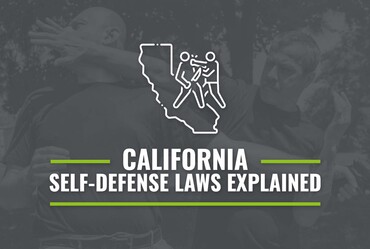Search

In a state as diverse and populous as California, understanding self defense laws is essential for residents and visitors alike. With rising concerns about personal safety and security, individuals need to be aware of their rights when it comes to defending themselves from physical harm. This blog will explore the intricacies of self defense laws in California, including key definitions, legal standards, and the regulations surrounding California self defense weapons laws. By gaining this knowledge, you can ensure that you remain within the bounds of the law while protecting yourself.
California self defense laws permit individuals to use reasonable force when they believe they are in imminent danger of being harmed. The law recognizes the right to protect oneself, but it also imposes certain limitations and responsibilities on the person claiming self defense. According to California Penal Code § 197, you may act in self defense under the following circumstances:
1. Imminent Threat: There must be an immediate risk of physical harm or injury to the individual.
2. Reasonable Belief: The belief that force is necessary must be reasonable. This means that a typical person in a similar situation would have felt the same way.
3. Proportional Response: The amount of force used in self defense must correspond to the threat. For example, using deadly force in response to a verbal provocation may not be justified.
A key aspect of self defense laws in California is the “duty to retreat.” This principle mandates that individuals who can safely retreat from an encounter must do so before resorting to the use of force. There are some exceptions, particularly when it comes to home defense. More on that later, but for now, here’s a breakdown:
1. Public Confrontations: In public spaces, individuals must attempt to escape a situation before acting violently. Ignoring this duty may weaken a self defense claim.
2. Home Protection: California’s “Castle Doctrine” grants individuals the right to use reasonable force to protect themselves within their own homes. Here, the duty to retreat does not apply, providing greater freedom to act in defense.
To fully understand self defense laws in California, it’s important to recognize the elements that courts consider when evaluating a self defense claim:
1. Imminent Harm: The threat must be immediate and not based on a fear of future harm.
2. Character of Threat: The nature of the threat must be assessed. If the aggressor poses a deadly threat, then employing lethal force may be justified.
3. Belief in Necessity: The individual claiming self defense must genuinely believe that using force is necessary to prevent harm.
4. Nature of Force Used: Courts will analyze whether the level of force employed was reasonable and necessary.
When discussing self defense laws in California, it is also essential to consider the regulations surrounding self defense weapons. California has specific laws governing various types of self defense tools, including:
1. Pepper Spray: Legal for personal protection, but it must not exceed 2.5 ounces and cannot be equipped with a trigger mechanism. Individuals using pepper spray must also be aware of the local restrictions regarding its use.
2. Stun Guns: Legal to carry and use in California, but individuals must not be prohibited from owning firearms and should be mindful of where they use these devices.
3. Firearms: The use of a firearm in self defense is legally permitted, but individuals must have a valid gun permit and comply with strict regulations. California has some of the strictest firearm laws in the United States, requiring registrations, background checks, and additional permits.
4. Knives: Carrying knives is permissible under state law as long as they adhere to certain length and use restrictions. However, using a knife in a self defense situation must align with the balance of reasonable force as previously mentioned.
Self defense may shield an individual from criminal prosecution; however, the legal landscape is complex. Misunderstandings or misapplications of self defense laws may lead to severe consequences, including:
Understanding self defense laws in California is crucial for anyone who wants to protect themselves legally. These laws are designed to empower individuals to safely respond to threats while also imposing important legal limitations to prevent misuse. Familiarizing yourself with how the law defines self defense, your duty to retreat, and the regulations surrounding self defense weapons can provide you with confidence and knowledge about your rights.
If you find yourself needing to navigate this complex legal system or have questions about specific situations, consulting with an experienced attorney is always advisable. They can offer guidance tailored to your unique circumstances, ensuring you remain within your legal rights while effectively safeguarding your personal safety.
With this understanding, you can embrace your right to protect yourself while being fully informed of your responsibilities under California law.